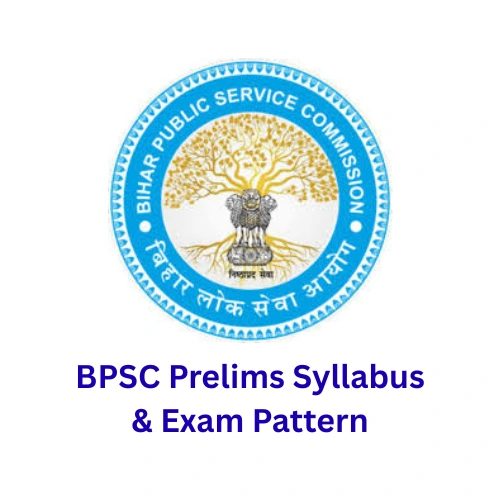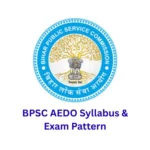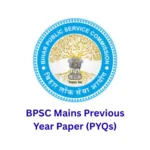BPSC Prelims Syllabus: According to the BPSC syllabus, the exam is conducted in three stages: Prelims, Mains, and Interview. The 72nd BPSC Prelims Exam will be held on 30th Sept 2026. For more details, candidates can visit the official website bpsc.bihar.gov.in.
BPSC Prelims Syllabus
Coming to the BPSC Syllabus in Hindi, after the recent changes, the structure of the BPSC syllabus looks like this:
- In the Prelims exam, the focus is on General Studies and Analytical Ability.
- In the Mains exam, deep study and detailed descriptive answers are expected.
BPSC Prelims Exam Pattern
| Paper Name | No. of Questions | Marks |
|---|---|---|
| General Studies Paper | 150 | 150 |
Important Notice: For each wrong answer, 0.33% marks will be deducted, and the duration of the exam is 2 hours.
BPSC Prelims Syllabus
Understanding the BPSC Prelims Syllabus in Hindi and preparing accordingly is nothing less than a key for any aspirant. This syllabus covers everything from historical events to current affairs, and from politics and economy to general science and mathematics. You must grasp the BPSC Prelims syllabus thoroughly, which includes the following:
- History: Ancient, Medieval, and Modern India, Freedom Struggle, and important Historical Sites.
- Geography: Indian and World Geography, Environment, Ecology, Climate, and Natural Resources.
- Polity & Constitution: Constitution, Governance, Fundamental Rights, Duties, Election System, etc.
- Economy: Indian Economy, Development, and National & International Institutions.
- General Science: Physics, Chemistry, Biology, and recent developments in Science.
- Current Affairs: National and International events, Science, Sports, Environment, etc.
- Reasoning & Mathematical Ability: Arithmetic, Statistics, Data Analysis, and Elementary Mathematics.
History:
The History section covers Ancient, Medieval, and Modern India in detail. Candidates are expected to study topics such as the Indus Valley Civilization, Vedic Age, Mauryan and Gupta Empires, Delhi Sultanate, and Mughal administration. The Modern period focuses on the Freedom Struggle, including revolts, reform movements, contributions of leaders, and key events leading up to India’s independence. Alongside, emphasis is also placed on important historical sites, cultural developments, and heritage that shaped Indian society.
Geography:
This section emphasizes both Indian and World Geography, including physical, social, and economic dimensions. Candidates must be well-versed with the Himalayan ranges, rivers, monsoons, soils, agriculture, industries, and population distribution. Equally important are topics on Environment, Ecology, Climate Change, and Biodiversity. Natural Resources such as forests, minerals, and energy resources, along with issues of conservation and sustainable development, also form a crucial part of the syllabus.
Polity & Constitution:
In this section, the focus lies on the Indian Constitution and its key features such as Fundamental Rights, Duties, Directive Principles of State Policy, and the parliamentary system. It also covers Union and State governments, the judiciary, election processes, Panchayati Raj institutions, and major constitutional amendments. Candidates are expected to understand governance structures and contemporary issues related to democracy and political institutions.
Economy:
The Economy segment includes the structure of the Indian Economy, planning, growth, development, and reforms. It also deals with agriculture, industries, banking, taxation, public finance, and international trade. Knowledge of National and International Economic Institutions like IMF, World Bank, WTO, and NITI Aayog is essential, as these bodies significantly influence India’s economic policies and strategies.
General Science:
This area tests a candidate’s understanding of Physics, Chemistry, and Biology along with their everyday applications. Key topics include health, nutrition, diseases, environment, biotechnology, space technology, defense technology, and the latest innovations in science. Awareness of scientific research and current technological advancements is also important.
Current Affairs:
Candidates must keep track of both National and International events that hold significance. This includes government policies, awards, sports events, environmental issues, scientific achievements, summits, treaties, and socio-political developments. Reading newspapers and journals regularly is crucial for this section.
Reasoning & Mathematical Ability:
This part of the syllabus assesses logical thinking, numerical aptitude, and problem-solving skills. It covers Arithmetic, Algebra, Statistics, Data Interpretation, and Analytical Reasoning. The questions are designed to test both conceptual clarity and the ability to apply knowledge to real-life problem situations.


